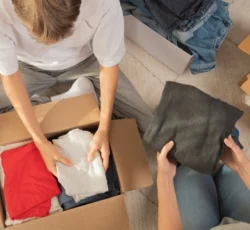How To Declutter Your Home Before Moving
 How To Declutter Your Home Before Moving
How To Declutter Your Home Before Moving
Before you move, it’s a good idea to declutter your home. It will help you organize your new space and make your moving process less stressful. One of the best ways to declutter is to start a few months in advance and take it slow. This will give you more time to thoughtfully decide which items to keep, donate or sell and make the process more efficient.
Keep It Simple
Before you start sifting through your belongings, make sure you have a plan for where to put them in your new home. This means figuring out how much space you have, how many storage areas there are, and what will fit where. Keeping it simple is a good idea when decluttering, and it will help you to avoid overflowing boxes or clutter in your new place. Instead of sifting through every item in your house, try breaking them into categories like books, papers, and memorabilia. You can also use a three boxes card as part of your decluttering strategy, which will help you keep things organized. Box number one is for items you want to keep in your new place, while boxes two and three are for those you’re ready to donate or sell.
Start Early
Decluttering the house before you move can save time and energy on both ends of the process, plus make your move much more pleasant. It also helps you get a better idea of what to pack ahead, so you don’t have to worry about forgetting something important or accidentally overpaying for movers. Start by examining every item you own, and whether or not it’s truly useful, needed or loved. You’ll want to get rid of any items that haven’t been used in a year or more. Next, consider all the kitchen stuff you have — appliances, dishes, pots and pans, cookware, linens, etc. You may be surprised to find that you don’t really use or need some of these things.
Donate Or Sell
When decluttering, it’s important to make sure you donate or sell any items that aren’t useful or will not be used in the new space. This will help you make the transition to a simpler lifestyle and start off on the right foot! There are many charitable organizations that will accept a variety of items, including clothing, books, and electronics. They also provide a tax receipt. And if you’re looking for some extra cash, selling your old items may be a good idea. You’ll get some money for your stuff, and it’s a chance to take control of the situation by finding a home for things that don’t fit in your new place. However, you can’t expect to make a lot of money with this route. It takes a bit of time and effort to price your items, and it can be difficult to find buyers.

 How To Survive Your First Few Weeks In A New Home
How To Survive Your First Few Weeks In A New Home